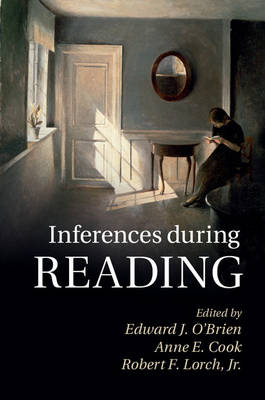
Inferences during Reading
Cambridge University Press (Verlag)
978-1-107-04979-6 (ISBN)
Inferencing is defined as 'the act of deriving logical conclusions from premises known or assumed to be true', and it is one of the most important processes necessary for successful comprehension during reading. This volume features contributions by distinguished researchers in cognitive psychology, educational psychology, and neuroscience on topics central to our understanding of the inferential process during reading. The chapters cover aspects of inferencing that range from the fundamental bottom-up processes that form the basis for an inference to occur, to the more strategic processes that transpire when a reader is engaged in literary understanding of a text. Basic activation mechanisms, word-level inferencing, methodological considerations, inference validation, causal inferencing, emotion, development of inferences processes as a skill, embodiment, contributions from neuroscience, and applications to naturalistic text are all covered as well as expository text, online learning materials, and literary immersion.
Edward J. O'Brien is Professor of Psychology at the University of New Hampshire. Anne E. Cook is Professor of Educational Psychology at the University of Utah. Robert F. Lorch, Jr is Professor of Psychology at the University of Kentucky.
1. Comprehending implicit meanings in text without making inferences Charles A. Perfetti and Joseph Z. Stafura; 2. Passive activation and instantiation of inferences during reading Anne E. Cook and Edward J. O'Brien; 3. Cognitive theories in discourse-processing research Gail McKoon and Roger Ratcliff; 4. Validation of text and discourse inferences – and explicit content Murray Singer; 5. Inference generation in text comprehension: automatic and strategic processes in the construction of a mental representation Paul van den Broek, Katinka Beker and Marja Oudega; 6. Emotion inferences during reading: going beyond the tip of the iceberg Pascal Gygax and Christelle Gillioz; 7. Inference processing in children: the contributions of depth and breadth of vocabulary knowledge Jane Oakhill, Kate Cain and Diana McCarthy; 8. A general inference skill Panayiota Kendeou; 9. Toward an embodied approach to inferences in comprehension: the case of action language Manuel de Vega; 10. The cognitive and neural correlates of individual differences in inferential processes Chantel S. Prat and Brianna L. Yamasaki; 11. Inferences during text comprehension: what neuroscience can (or cannot) contribute Evelyn C. Ferstl; 12. Causal inferences and world knowledge Leo Noordman, Wietske Vonk, Reinier Cozijn and Stefan Frank; 13. Constructing inferences in naturalistic reading contexts Arthur C. Graesser, Haiying Li and Shi Feng; 14. Inference generation during online study and multimedia learning Kirsten R. Butcher and Sarah Davies; 15. What about expository text? Robert F. Lorch, Jr; 16. The role of inferences in narrative experiences Richard J. Gerrig and William G. Wenzel; 17. Interpretive inferences in literature Susan R. Goldman, Kathryn S. McCarthy and Candice Burkett.
| Erscheint lt. Verlag | 16.4.2015 |
|---|---|
| Zusatzinfo | 15 Tables, black and white; 25 Line drawings, black and white |
| Verlagsort | Cambridge |
| Sprache | englisch |
| Maße | 160 x 236 mm |
| Gewicht | 800 g |
| Themenwelt | Geisteswissenschaften ► Psychologie ► Allgemeine Psychologie |
| Geisteswissenschaften ► Psychologie ► Pädagogische Psychologie | |
| Geisteswissenschaften ► Psychologie ► Verhaltenstherapie | |
| Geisteswissenschaften ► Sprach- / Literaturwissenschaft ► Anglistik / Amerikanistik | |
| Geisteswissenschaften ► Sprach- / Literaturwissenschaft ► Sprachwissenschaft | |
| Naturwissenschaften ► Biologie ► Zoologie | |
| ISBN-10 | 1-107-04979-2 / 1107049792 |
| ISBN-13 | 978-1-107-04979-6 / 9781107049796 |
| Zustand | Neuware |
| Haben Sie eine Frage zum Produkt? |
aus dem Bereich


